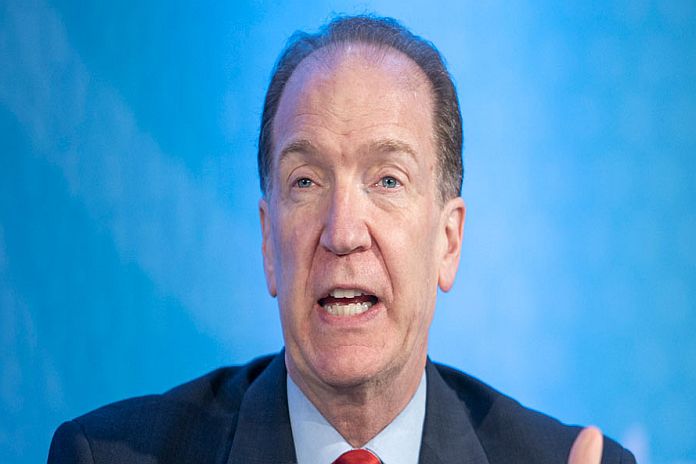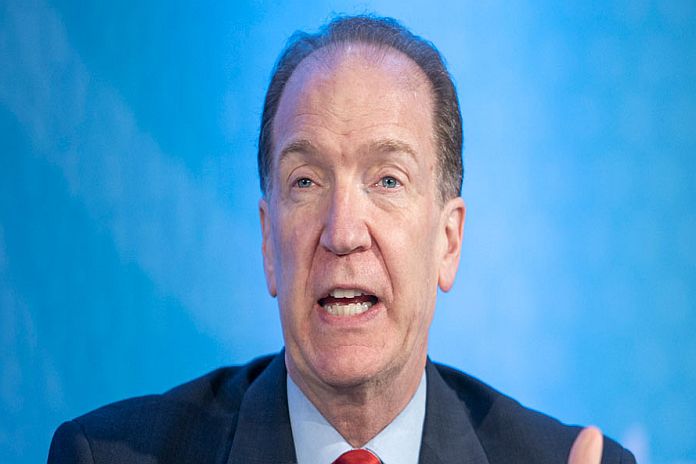Strong and growing support for a successful IDA20

Remarks by World Bank Group President David Malpass at the 2021 Annual Meetings.
By David Malpass
WASHINGTON, USA – I’ve already participated in meetings with the G24, parliamentarians, and CSOs, the civil society organizations. I joined a meeting of the G20 Leaders yesterday on Afghanistan. I’ve also met with Secretary Yellen, John Kerry, the president of Colombia, and ministers from Mexico, Japan, and Korea. I’ve welcomed their strong and growing support for a successful IDA20. That’s important.
Throughout the week we will be discussing a broad range of development issues – the economic outlook, growth, vaccines, debt, climate, trade, among others.
As you know, the world is suffering from a dramatically uneven recovery. Inequality is worsening across country groups. Per capita income in advanced economies is growing nearly 5 percent in 2021, but that is compared to only 0.5 percent in low-income countries. The outlook remains grim for most of the developing world. There’s high inflation, there are too few jobs, there are shortages that extend to food, water, and electricity.
For example, due to the pandemic, the factory and port shutdowns going on, the bottlenecks in logistics and supply chains are worsening. We see sharp increases in the backlog of orders. Our estimates suggest that 8.5 percent of global container shipping is stalled in or around ports. That’s twice as much as in January of 2020. These disruptions are placing sharp price increases on shipping fees, and the final costs of goods, and some of them will not be transitory. It would take time and cooperation of policymakers across the world to sort them out.
As we look at development, the pandemic is pushing up poverty around the world. It’s already pushed nearly 100 million people into extreme poverty. That’s the added number in extreme poverty.
We’re witnessing a tragic reversal in development. The progress in reducing extreme poverty has been set back by years – for some, by a decade. And it’s vital that we address this head-on by redirecting policies in both the advanced economies and developing countries so that growth and investment are more widespread.
Our highest priority is to secure access to vaccines and speed up shots in arms. I chaired the Multilateral Leaders Taskforce, which includes Kristalina, Tedros, and Ngozi. We had a good public discussion yesterday and we’ll soon be holding our fifth meeting of the Taskforce focused on matching the extensive pledges and trying to help actual vaccinations come out of the pledges that have been given by the advanced economies. There’s got to be a way to close that deployment gap.
The World Bank is able to finance the doses and the deployment, but there needs to be early deliveries scheduled, so we are urging governments that have sufficient doses to swap early deliveries to allow for vaccinations in developing countries and we are urging the finance ministers and health ministers of developing countries to enter contracts in order to get deliveries early, as soon as possible of vaccines. And we’re working with countries also to reduce the hesitancy to encourage the vaccination of people. Our observation through the Taskforce, and through our country programs, is that when the countries are able to get vaccines, people are being vaccinated and the vaccination rate is going up consistently when the supply is available.
The World Bank’s support for the poorest countries is at an all-time high. We’re working to help countries secure more doses and deploy them. I was in Sudan and Jordan, where I witnessed firsthand – this is now two weeks ago, seems like yesterday -vaccination efforts, and they are accelerating. I’m pleased, the World Bank now has 250 million doses under contract with bank financing. Those deliveries will be going on in the coming months, and that is very important to saving lives.
I want to mention another couple of priorities and then turn to your questions. The debt challenges are confronting many countries. On Monday, we released the annual IDS [International Debt Statistics] report. And it showed a 12 percent increase in debt for the low-income countries, reaching $860 billion. We need new systems to push that along, because so many countries are in external debt distress or at high risk of it. We need a comprehensive approach, including debt reduction, swifter restructuring, and more transparency in order to make progress on this problem.
With the IDA20 replenishment in December, African heads of state have already called for donors to be ambitious in their support for IDA’s mission. The financing needs are urgent, they’ll remain elevated for years, and a successful IDA20 is vital. We’re moving toward the conclusion of the IDA20 fundraising effort in December in Tokyo. I met with the deputy finance minister yesterday. And we’re pleased with the progress – we’re very pleased with the strong support worldwide for a larger IDA20 replenishment.
Resources will be a topic this week. And we’ll also need active participation with the public and private sectors. I mentioned my meetings with parliamentarians, with CSOs, and we’re meeting regularly with foundations – indeed the whole international community in order to help bring the resources to bear on the range of challenges, including vaccines, debt, and of course climate change issues.
I have received a note. I must have said 250,000 doses, but I meant 250 million doses – a quarter of a billion doses are under contract by the World Bank that can get to countries through country financing programs. And we are working as hard as we can 24/7 to expand that number as soon as we can get doses and delivery schedules from the advanced economies and from the manufacturers.
Source: caribbeannewsglobal.com



